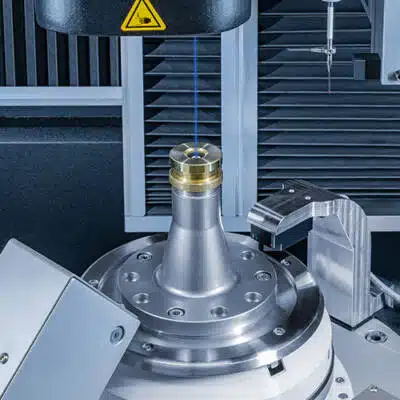August 7th, 2024
The ATS 100 alignment turning station combines the proven OptiCentric® centration measurement system with an ultra-precise turning machine. Alignment turning allows the cell’s edge of a mounted lens to be machined with the aim of centering the optical axis of the lens and optimizing the lens distances. The cell diameter as well as the top and bottom of the cell are processed for this purpose. The high-precision measurement of the decentration, the accurate alignment of the optical axis to the rotation axis of the turning machine and the very precise machining of the cell edge ensure alignment-free assembly of mounted lenses and now also of laser diodes.
Dr. Christian Buss, R&D Manager ATS, explains the functional principle: “In contrast to lenses, the laser beam of mounted laser diodes is aligned with the rotation axis of the turning machine. Lasers can be aligned in the wavelength range between 405 nm and 905 nm without any further adjustments. The power supply to the diode is particularly noteworthy: Here, the alignment chuck offers generous space for the type-specific electronics and the transfer to the diode is contact-free via the spindle.” The standard measurement head of the ATS 100 is used to measure the laser beam inclination; a second measurement head is added to measure the displacement. Filters adjust the exposure on the cameras and thus optimize the evaluation. The measurement setup is very compact overall and can also be retrofitted to machines already in use.
The alignment of the diode regarding inclination and displacement to the rotation axis of the alignment turning machine is performed as usual by the alignment chuck. The processing of the mount is also no different to that of mounted lenses: the diode mount is machined centrically to the laser beam using turning tools. “The ATS 100 therefore simplifies the assembly of laser diodes. Any additional alignment steps in final assembly can be omitted, thus significantly increasing production efficiency,” says Buss, summarizing the benefits. “It should be emphasized that we are not only talking about point light lasers here; ellipse and line lasers can also be centered in relation to their laser axis.”
This application is controlled by the tried-and-tested ATS Control software. It combines the operation of machine functions with the routines for measuring centration errors and alignment. The user receives step-by-step instructions for setting up the test object geometry and carrying out the machining operations. The software also continuously monitors the results of the manufacturing process.





